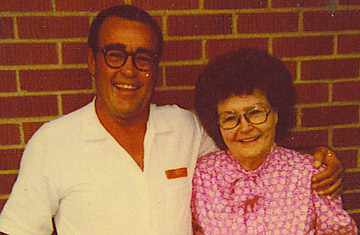
Claude Jones, with his mother, about two years before he was executed by the state of Texas in 2000
In the months since I first met Duane Jones at his lawyers' office in downtown Houston, we've talked quite a bit on the phone. We've talked about the book he's writing (a memoir of his violence-plagued and seemingly star-crossed life). We've talked some about politics, about the oil spill. But mostly we've talked about the legal battle surrounding his deceased father and about why it is taking so long to get a ruling in the case.
Last night he called me, asked if I was sitting down and told me, "You won't believe this, but they finally ruled. And it's in our favor."
After nearly eight months of deliberation, Judge Paul Murphy ruled on June 11 that Jones' father Claude, executed in 2000 for the murder of a Point Blank, Texas, liquor-store owner, should have another day in court. Specifically, that the only physical evidence linking Jones to the crime — a 1-in. (2.5 cm) piece of hair that somehow survived a destruction order years ago — had to be preserved, against the wishes of San Jacinto County, and transferred to an independent forensics laboratory for DNA testing that hadn't been available during the original trial.
Barry Scheck, co-director of the Innocence Project, which sued (along with the Texas Observer magazine) to have the hair tested, said, "We undertook this litigation for two reasons: to find the truth and to vindicate the public's right to know. We're glad the judge agreed with us." William Knull, the Houston lawyer who represented Scheck and the others, called it a "victory for the idea that the public has a right of access to the facts."
Sara Forlano, part of the legal team that was defending San Jacinto County district attorney Bill Burnett in the case, said by e-mail that her office was "disappointed" by the ruling but that there have been no decisions made yet about possible appeals. According to Knull, San Jacinto County has 30 days to file a notice of appeal against the order.
There has been another death in the middle of this murder case. Burnett was diagnosed with pancreatic cancer on May 26 and died less than a week later. He was at the very center of the case, first as an assistant prosecutor in the original trial, then later as the DA who steadfastly refused to have the hair retested. A former probation officer who worked his way up to become a top lawman and a leading figure in the county, Burnett never sat down for an interview with TIME about the case, yet a deposition revealed him to be cordial but unyielding on his assertion that, under Texas law, only the inmate could request additional DNA testing. And since the inmate in this case was deceased, Burnett was under no obligation to do anything but destroy the evidence. "Once the defendant has been executed, I can do nothing more in the case," he said.
According to a local paper, the Eastex Advocate, Pastor Preston Baker's sermon at Burnett's funeral in Coldspring, Texas, mentioned TIME's article about the Jones case and Burnett's willingness to take on the Innocence Project. The Advocate quoted Baker as saying Burnett "took a stand against some powerful people, people who believed that just because of their power and influence they could demand something."
Burnett's personal imprint on the case was so great that shortly after he died, Knull contacted San Jacinto County to see if they would reconsider their opposition to testing. Knull says he was told that the new DA, whom Governor Rick Perry will have to appoint, will make that decision. But Burnett was in the process of running for re-election unopposed, and it's possible that a new DA will be elected in November and begin serving in January. "They can do what they need to do to keep the [possibility of appeal] alive until the new DA starts," says Knull.
The mitochondrial DNA test, if and when it takes place, could have three possible outcomes. If the DNA profile matches Jones', then Jones was likely the killer. If the hair doesn't match anyone, then the Jones verdict would still be very flawed — a "legal nullity," as Scheck put it — because Jones' earlier appeals were denied on the basis of that hair. (In 2004, the prosecution's star witness said that prosecutors pressured him into lying about Jones' alleged confession.) If the DNA profile matches Danny Dixon's, a co-defendant who was supposedly waiting outside the liquor store, then it would suggest it was Dixon, not Jones, who pulled the trigger. Either one of the latter outcomes would be "extremely important" to Texas, said Scheck. "I think people will be disturbed."
It would certainly offer the most conclusive biological proof to date that the state of Texas executed a man for a crime he didn't commit. And that kind of vindication, Duane Jones told me, is worth waiting for.
